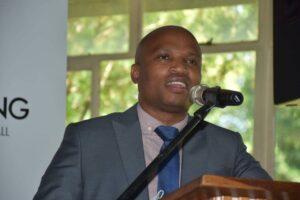By Staff Reporter
QWAQWA – Researchers in the University of the Free State’s (UFS) Division of Human Genetics believe the implementation of a new diagnostic test for familial breast and ovarian cancer – using new technology based on rapid point-of-care (POC) testing – will reach more communities and hopefully contribute to saving more lives.
According to a statement issued this week, the principal medical scientist in the Division of Human Genetics within the Faculty of Health Sciences and the National Health Laboratory Service, Dr Nerina van der Merwe, and PhD candidate Jaco Oosthuizen, are involved in a collaborative project with Prof Maritha Kotze and her research group from Stellenbosch University.
“We were approached by Prof Kotze, who is also very passionate about cancer research. She and her team, together with a company in the United Kingdom, have been working on designing a POC assay for this new technology, based on our research results. We became involved, as we are currently the state referral centre for familial breast and ovarian cancer in the country and have screened more than 3 000 patients diagnostically up to now. With the use of our research results and access to positive controls, we are in a position to assist with the validation and potential implementation of this technology in the future,” says Dr Van der Merwe.
Van der Merwe says this new technology – once it is validated as a diagnostic genetic test – is the future of familial breast and ovarian cancer testing in South Africa when performed in conjunction with genetic counselling. The robustness of the assay and user-friendly practical method makes it extremely suitable for use in rural clinics, thereby eliminating the need for expensive laboratory equipment. By performing the test at the community clinic, patients no longer have to be transported to tertiary hospitals for genetic testing, and more patients and related family members who are unaware that they have inherited a disease-causing change in high-risk cancer genes such as BRCA1 or BRCA2, will be reached.
Dr Van der Merwe has been involved with genetic research on familial breast and ovarian cancer since 1995 and says this is the outcome of nearly 30 years of South African-specific cancer research. She was appointed with the main goal of determining the range and contribution of genetic changes in these two genes to our population. Her work, in collaboration with Prof Lizette van Rensburg from the University of Pretoria, identified the first South African-specific variants, which proved to represent South African-unique recurrent, or founder variants found in African and Afrikaner populations. Gradually, the number of founder variants unique to our population increased to a total of six, says Dr Van der Merwe. The presence of these founder variants in our population is ideal for the implementation of rapid POC testing, as these variants are common in affected patients and justify being screened first, before moving onward to more expensive diagnostic testing.
She is extremely excited that the progress being made in the field will not only benefit the patient, but also unaffected at-risk family members. According to her, implementation of this new technology has various benefits; not only is it cheap and robust, but the results are available within 90 minutes. Another benefit is that the test will be validated using saliva or a buccal swab, which is less invasive than taking a blood sample. By performing genetic counselling while the test is running, patients and family members will have the opportunity to ask questions about genetic testing and cancer, which will simultaneously increase community awareness. By talking during a face-to-face consultation, the counsellor can ensure that the patient and related family members understand the value of the test. This will eventually result in an increase in the currently low uptake of genetic testing in related at-risk family members, as this cancer type is inherited.

“The majority of the patients we are currently testing are already affected. Should a patient test positive, it might assist in their cancer treatment. We, however, need to screen the related family members to identify who is at an increased risk, but currently, this is not the case. So, I think by taking the test to the patients, that is where the benefit would be, as patients are often accompanied to the clinics by their family members. This will provide an opportunity to inform them, as patients often do not discuss their diagnosis and test results with family members. This is evident in patients receiving a positive test result for an inherited disease, but who are not even aware of a family history for these cancer types. This applies especially to African communities.”
“The possible impact of such a testing strategy makes me extremely excited, because why are we doing this? We need to warn unaffected related individuals about their risk, which can only be done by testing them. By doing this, we can play a part in the earlier detection or diagnosis of patients, ultimately improving their cancer survival rate.”
Apart from founder testing, Dr Van der Merwe and her team have since broadened their testing regime from screening for BRCA1 and BRCA2 only, to multi-gene panel testing using next-generation-sequencing to include other genes causing these two and other specific cancer types.






More Stories
City manager in appointment controversy
Advertorial | Maluti TVET Graduation Ceremony
Manapo children receive gifts